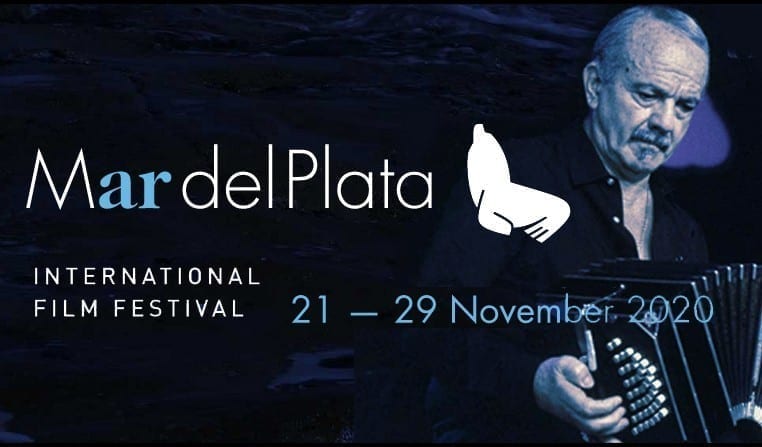On these November days, Argentina is hosting the 35th Mar del Plata International Film Festival, one of the world’s most prestigious film festivals and the only category “A” film festival in Latin America according to the International Federation of Film Producers Associations (FIAPF). Due to the pandemic, this year for the first time the festival is being held in a virtual format.
A little bit of history
The Mar del Plata Film Festival was first held in 1954 at the initiative of the President of Argentina, Juan Domingo Perón. It was a major international event, with 18 countries participating. The city of Mar del Plata was visited by a silent movie legend, American actress Mary Pickford, Hollywood sex symbol of the 1930s and 1940s Errol Flynn, world-famous Italian actress Gina Lollobrigida, and cult Soviet director Sergei Bondarchuk. The festival featured dozens of films by directors such as Vittorio de Sica, Luis Buñuel and Ingmar Bergman.
The original idea behind the festival was to support the national film industry and bring world cinema closer to the Argentinean public. The competition was organized only in 1959, with three Soviet films taking part. The main award for the best film went to Ingmar Bergman’s Wild Strawberries.
The Mar del Plata Festival strengthened the role of cinema as a cultural phenomenon and became a platform for the exchange of world achievements in the field of cinematography. Bringing together directors, theorists and journalists from all over the world it had become one of the most prestigious film festivals in the region.
However, the social and political instability in Argentine led to the Festival ceasing to exist after 1970. Almost a quarter of a century and a few unsuccessful attempts later, it was finally revived in 1996.
Modern period
With the resumption of its work under the leadership of the National Institute of Film and Audiovisual Arts (INCAA), the film festival quickly began to regain its international popularity.
It was held several times in the early 2000s in March, but since 2008, November has become the traditional month for the Mar del Plata International Film Festival. At this stage, FIAPF awarded the festival a category “A”, making it one of the world’s most prestigious film events.
As the festival developed, its competition programme gradually expanded. Now it includes:
- Official International Competition,
- Latin American Feature Film Competition,
- Argentine Feature Film Competition,
- Latin American Short Film Competition,
- Argentine Short Film Competition,
- Work-in-progress Competition (Argentine and Latin American films only),
- Altered Stated Competition.
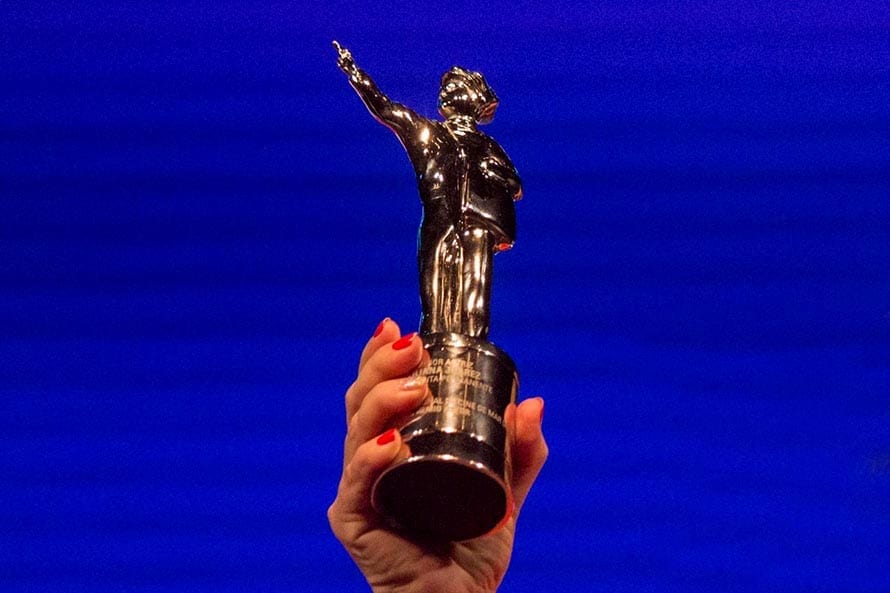
In addition to the Competitive section, the Mar del Plata International Film Festival offers participants quite a range of extra-activities, like Panorama section where thematic tracks showcase the latest works of international production by renowned filmmakers as well as debutantes.
An important part of the festival is also the Tributes and Retrospectives section, that seeks to revisit the work of prestigious directors putting them back into circulation. It also aims at popularizing modern cinema. It is a key section that values films based on their cultural legacy for present and future cinema.
Another section of the festival, the Rescues, is designed to revive the masterpieces of the global film industry and give viewers new impressions of old films.
In addition to film screenings, festival guests can enjoy an extensive cultural programme. The organizers prepare informative discussions, master classes, seminars and round tables on the history and theory of cinema, cinema critique and perspectives of cinema, there are also book presentations and special screenings. Some of these events are available on YouTube. Since 2018, the Mar del Plata International Film Festival has featured a Cinema and Gender Perspective Forum, a key space for reflection that exposed the inequalities of the audiovisual industry. The Forum has already established itself on an international level.
Soviet and Russian films in Mar del Plata
Despite the distance, many Russian films were presented at the Argentine Film Festival in different years.
During the first period of the Festival’s existence, only 10 editions took place in Mar del Plata (1959–1970), where the USSR presented a total of 12 films, among them: “War and Peace” by Sergei Bondarchuk, “Don’t Grieve” by Georgy Daneliya, “The Girls” by Yury Chulyukin and “The Last Month of Autumn” by Vadim Derbenev.
Films by Yury Chulyukin and Vadim Derbenev brought awards to the Soviet Union for the best female (Nadezhda Rumyantseva) and best male role (Evgeny Lebedev) in 1962 and 1966, respectively. In 1968, Tatiana Lioznova’s film “Three Poplars on Plyushchikha” won the award by International Catholic Organization for Cinema and Audiovisual (OCIC) at the Mar del Plata Festival.
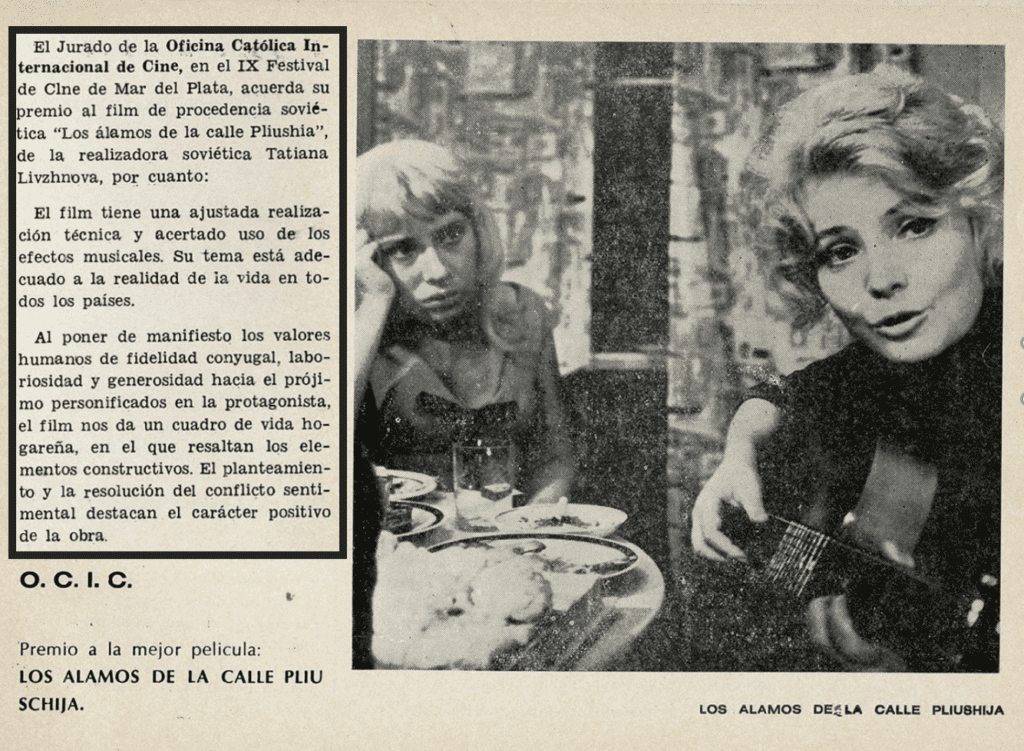
During the new history of the Mar del Plata International Film Festival, several dozens of Russian films were presented, including works by such renowned film directors as Alexei Balabanov, Alexander Sokurov, Alexei German, as well as less recognized authors. But only a few films were submitted for the competition, and two of them brought their creators prestigious awards.
In 2010, Alexei Fedorchenko’s film “Silent Souls” received two Silver Astors for Best Script (Denis Osokin) and Best Direction. In 2016, Andrei Konchalovsky’s film “Paradise” was also awarded the prize for the Best Script (Elena Kiseleva and Andrei Konchalovsky).
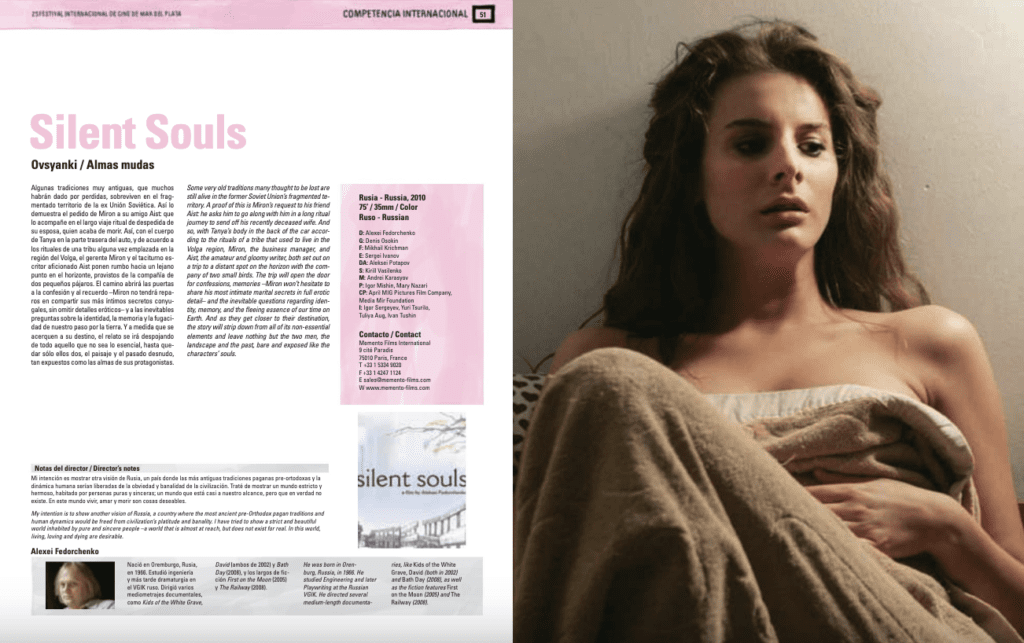
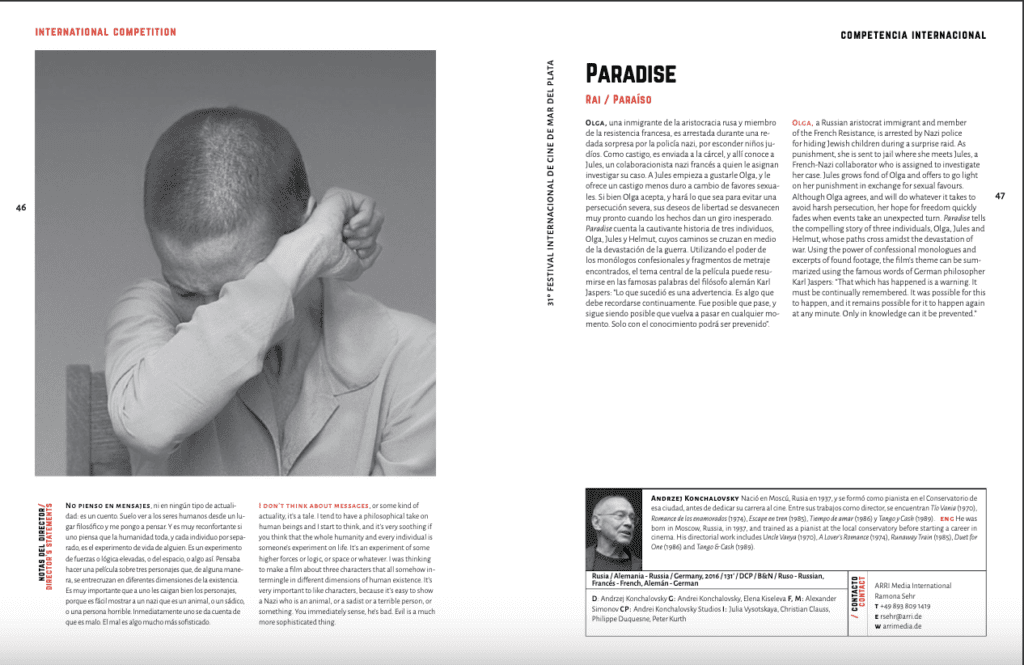
35th Mar del Plata International Film Festival, 21–29 November 2020
This year, the 35th Mar del Plata International Film Festival is being held for the first time in virtual format and it is available to everyone throughout Argentine absolutely free of charge. As a result, the organizers had to limit the number of films to be shown, but the main competition categories and non-competitive sections were retained.
This year’s festival commemorates Fernando “Pino” Solanas, a well-known Argentine film director, who was among the founders of the “third cinematograph” – a movement that condemns the Hollywood model of film production, in which the film is an entertainment product focused only on making money. Solanas made acute social and political films. His first feature film work in 1968 was “The Hour of the Furnaces”. This film opened the Mar del Plata Film Festival this year.
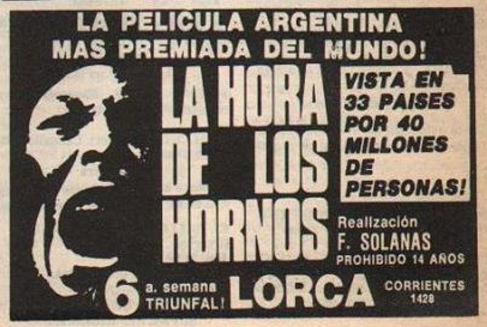
Cinematic talent of Pino Solanas is well known all over the world. The director won the most prestigious film awards, including the Cannes and Venice Film Festivals. In addition, Fernando Solanas was actively involved in politics. In 2007, he ran for the presidency of Argentina.
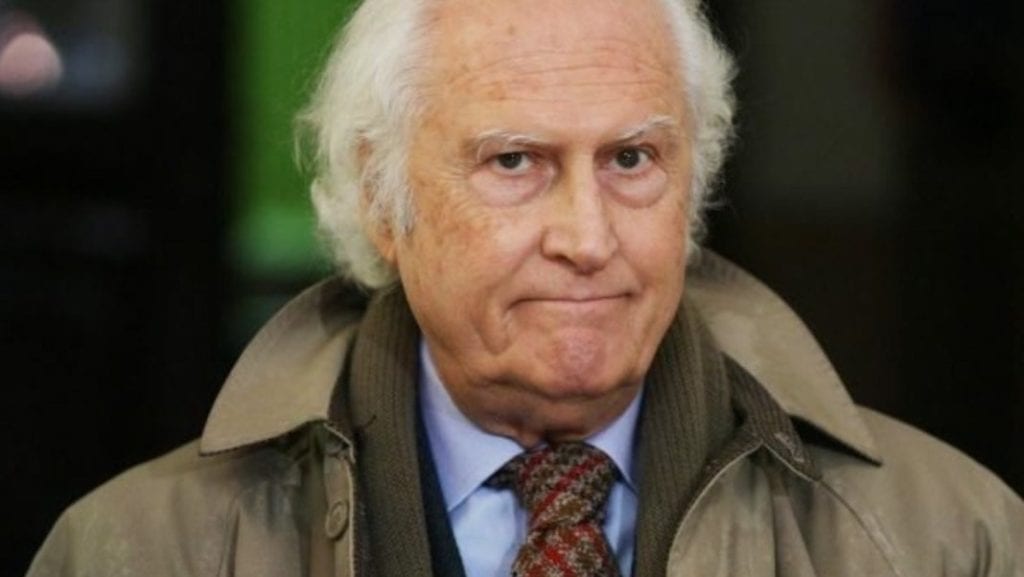
This year’s international competition programme does not include films from Russia, but Altered Stated Competition includes a documentary film by French director of Russian origin, Vladimir Leon, titled “My Dear Spies” (originally “Mes chers espions”). This film is about two brothers, Pierre Leon and Vladimir Leon, who explore the history of their family, answering whether their grandparents were Soviet spies in Paris in the 1930s.
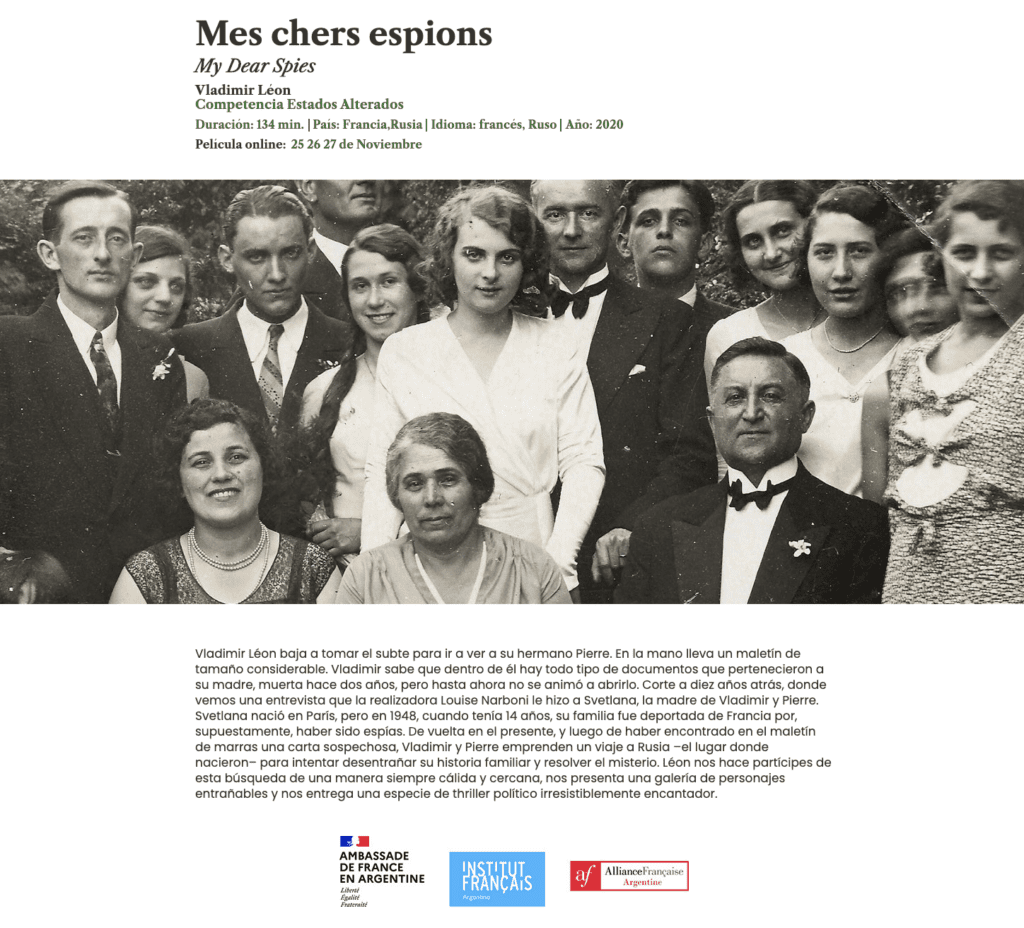
The children’s films section of Mar de Chicas y Chicos presents animated work titled “Listik” (the Republic of Belarus and the Czech Republic) by the young director Alyona Baranova, the young also known among Russian animators.
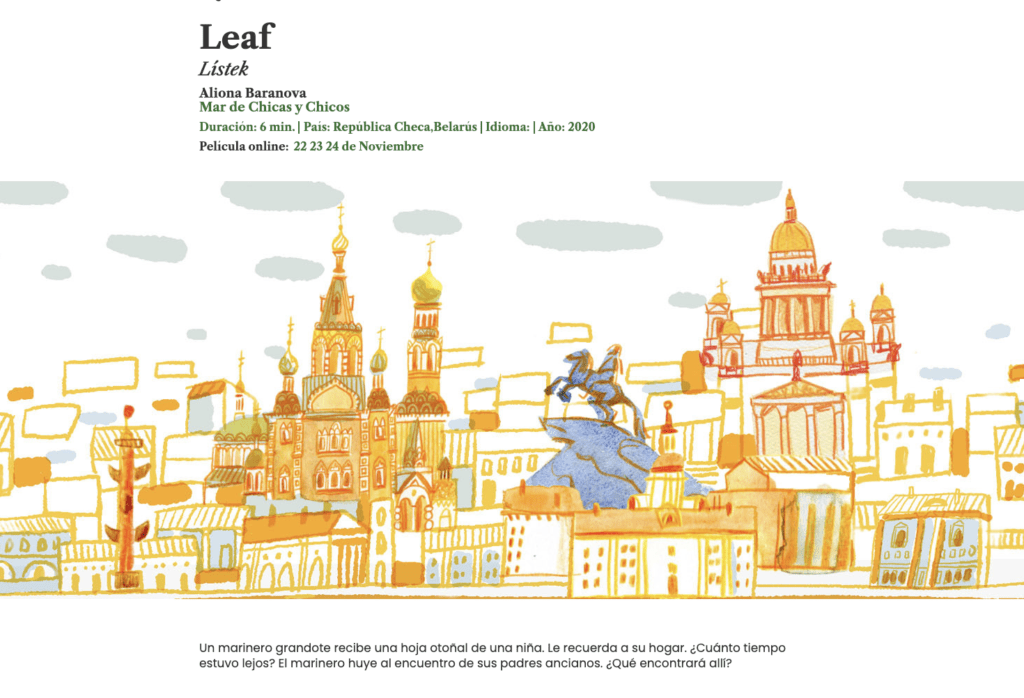
Most of the films participating in the festival are Argentine and Latin American films. To a lesser extent there are films from other regions. The film festival in Mar del Plata is gaining popularity among Asian directors. And we want to believe that Russian cinema also will appear more often in the Mar del Plata Film Festival.
The pandemic has posed serious challenges to the film industry and forced the exploration of new formats, not only as part of the film production process. Perhaps the best that the coronavirus crisis will bring to international film festivals is the opportunity to break free of the shackles of geography and to achieve a new level of interpenetration between cinematographic art from different countries.

